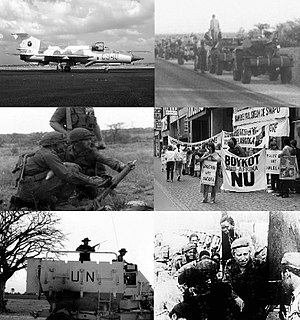| UN Security Council Resolution 602 | |
|---|---|
 South African military operations in Angola | |
| Date | 25 November 1987 |
| Meeting no. | 2,767 |
| Code | S/RES/602 (Document) |
| Subject | Angola-South Africa |
Voting summary | 15 voted for None voted against None abstained |
| Result | Adopted |
| Security Council composition | |
Permanent members | |
Non-permanent members | |
United Nations Security Council resolution 602, adopted unanimously on 25 November 1987, after hearing representations from the People's Republic of Angola, the Council recalled resolutions 387 (1976), 428 (1978), 447 (1979), 454 (1979), 475 (1980), 545 (1983), 546 (1984), 567 (1985), 571 (1985), 574 (1985) and 577 (1985), expressing its concern at the continuing military incursions into the country by South Africa through occupied South West Africa (Namibia).

The People's Republic of Angola was the self-declared socialist state which governed Angola from its independence in 1975 until 1992, during the Angolan Civil War.

United Nations Security Council Resolution 387, adopted on March 31, 1976, reaffirmed the principle of a state's right to territorial integrity in the face of South African incursions into Angolan territory. The Council recognized the international disturbance at South Africa's actions and expressed its concern over them. The Resolution condemned South Africa's actions and demanded that it respect the territorial integrity of Angola. The Council further demanded that South Africa desist from using the "international Territory of Namibia" to mount provocative or aggressive acts against other states and called upon the South African government to meet Angola's just claims for compensation.

United Nations Security Council Resolution 428, adopted unanimously on May 6, 1978, after hearing representations from the People's Republic of Angola, Zambia and the South West Africa People's Organisation (SWAPO), the Council reminded Member States to refrain from using threats and use of force in their international relations. Reiterating Resolution 387 (1976), the present resolution condemned South Africa for its armed invasion of Angola via South West Africa (Namibia).
Contents
The Council demanded South Africa cease Operation Moduler and respect Angola's sovereignty and territorial integrity, noting the "illegal entry of the head of the racist South African regime and some of his Ministers" into Angola. The representative of Ghana, which introduced the resolution, said the continued attacks were an affront to the Council's authority. [1] It called for a complete and unconditional withdrawal of South African forces from southern Angola, requesting the Secretary-General to monitor the implementation of the current resolution and reporting back no later than 10 December 1987.

Operation Moduler was a military operation by the South African Defence Force (SADF) during the South African Border War. It formed part of what has come to be called the Battle of Cuito Cuanavale. The Angolan objective was to advance south-east to attack the UNITA at Mavinga. The SADF objective was to protect UNITA by stopping that advance. The advance was halted with heavy Angolan casualties. The South African forces and its UNITA allies then began offensive operations against the Angolan forces, who had retreated back to a defensive line east of the Cuito River with the objective of destroying them once and for all.

Ghana, officially the Republic of Ghana, is a country located along the Gulf of Guinea and Atlantic Ocean, in the subregion of West Africa. Spanning a land mass of 238,535 km2 (92,099 sq mi), Ghana is bordered by the Ivory Coast in the west, Burkina Faso in the north, Togo in the east and the Gulf of Guinea and Atlantic Ocean in the south. Ghana means "Warrior King" in the Soninke language.

The secretary-general of the United Nations is the head of the United Nations Secretariat, one of the six principal organs of the United Nations. The secretary-general serves as the chief administrative officer of the United Nations. The role of the United Nations Secretariat, and of the secretary-general in particular, is laid out by Chapter XV of the United Nations Charter.
The resolution was a direct rejection of South Africa's offer to withdraw its troops from Angola if other nations, such as Cuba, did the same. [2]

Cuba, officially the Republic of Cuba, is a country comprising the island of Cuba as well as Isla de la Juventud and several minor archipelagos. Cuba is located in the northern Caribbean where the Caribbean Sea, Gulf of Mexico and Atlantic Ocean meet. It is east of the Yucatán Peninsula (Mexico), south of both the U.S. state of Florida and the Bahamas, west of Haiti and north of both Jamaica and the Cayman Islands. Havana is the largest city and capital; other major cities include Santiago de Cuba and Camagüey. The area of the Republic of Cuba is 110,860 square kilometers (42,800 sq mi). The island of Cuba is the largest island in Cuba and in the Caribbean, with an area of 105,006 square kilometers (40,543 sq mi), and the second-most populous after Hispaniola, with over 11 million inhabitants.





